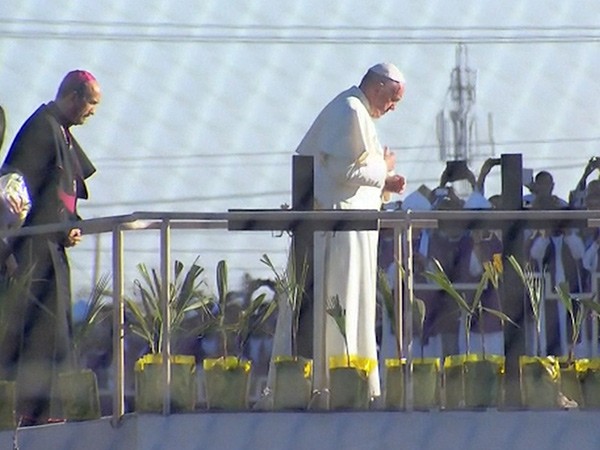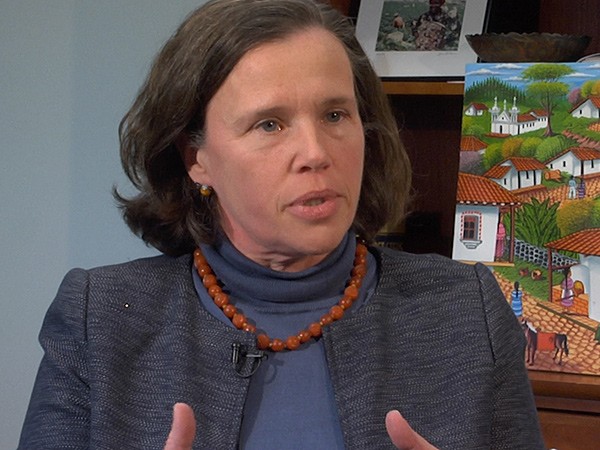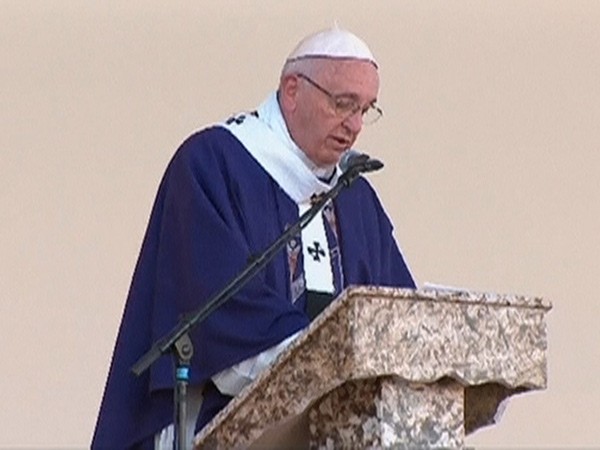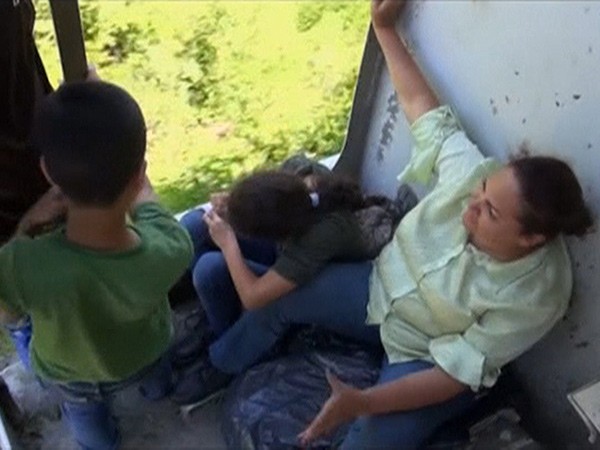 KIM LAWTON, correspondent: It was a dramatic moment: Pope Francis standing on a platform at the border between the US and Mexico, silently praying at a makeshift memorial built to honor the thousands who have died trying to cross the border. He blessed the memorial, and then he blessed hundreds of people watching from the American side of the fence, among them families who are seeking asylum in the US.
KIM LAWTON, correspondent: It was a dramatic moment: Pope Francis standing on a platform at the border between the US and Mexico, silently praying at a makeshift memorial built to honor the thousands who have died trying to cross the border. He blessed the memorial, and then he blessed hundreds of people watching from the American side of the fence, among them families who are seeking asylum in the US.
During a Mass in a nearby fairground, Francis appealed to people on both sides of the border to show compassion and mercy in what he called “the human tragedy” of forced migration. He said too many people in Central America are victims of poverty, human trafficking, and violence from gangs and drug dealers. He added, “This crisis which can be measured in numbers and statistics, we want instead to measure with names, stories, families.”
Francis, who is the son of Italian immigrants in Argentina, cited the biblical prophet Jonah, saying “to weep over injustice, to cry over corruption…these are tears that lead to transformation.”
It was a message enthusiastically received both in Juarez and across the border in El Paso, where people had also gathered. But the visit also generated some political criticism on this side of the border.
GOP presidential candidate Donald Trump told a Fox Business Network program he thought Francis was manipulated by Mexico. Trump said he didn’t think the pope understands what he called “the danger of the open border that we have with Mexico.”
On the plane headed back to Rome, Francis was specifically asked about Trump’s plan to build a wall between the US and Mexico. The pope responded, “A person who thinks only about building walls…and not building bridges is not Christian.”
Meanwhile, many US advocates of comprehensive immigration reform hope Francis’s words and actions will bring a new moral authority to their cause.
 JEANNE ATKINSON (Catholic Legal Immigration Network): It is hugely important to have the voice of Pope Francis.
JEANNE ATKINSON (Catholic Legal Immigration Network): It is hugely important to have the voice of Pope Francis.
LAWTON: Jeanne Atkinson is executive director of the Catholic Legal Immigration Network, or CLINIC, an organization founded by the US Conference of Catholic Bishops to protect the dignity and rights of immigrants.
ATKINSON: He is putting a line and putting a face on the immigrant experience. He’s very much, I think, telling us we are immigrants. These are our brothers and sisters, it’s not “they” and “them.”
LAWTON: The plight of migrants and refugees has emerged as a key priority for this pope.
In July 2013, Francis’s first official trip outside of Rome was to Lampedusa, an island off the coast of Italy. There he remembered the thousands of migrants who drowned trying to cross the Mediterranean Sea from North Africa.
Last month, during his annual address to the Vatican diplomatic corps, Francis specifically highlighted the migrant crisis in Europe, urging “respect for the dignity of every person…however much they may prove a difficult burden to bear.”
 Francis is not the first pope to speak about immigration, and there is long-established Catholic social teaching on the issue.
Francis is not the first pope to speak about immigration, and there is long-established Catholic social teaching on the issue.
ATKINSON: The story of migration is rooted in our history as Catholics. I mean it’s everything from the Jewish people’s exile in Exodus to the holy family’s flight to Egypt. In the first five books of Hebrew scripture, taking care of the alien, the stranger, was mentioned 36 times. So this is who we are as American Catholics. We are an immigrant people and an immigrant church.
LAWTON: According to teaching principles outlined in the Catholic Church catechism, prosperous nations are obligated “to the extent they are able, to welcome the foreigner in search of the security and means of livelihood which he cannot find in his country of origin.”
ATKINSON: The Catholic Church says people have a right not to migrate, so they should have what they need at home so that they don’t have to leave. If they do have to leave, they have a right to migrate to take care of themselves and their families.
LAWTON: Catholic teaching does recognize that sovereign nations have the right to control their borders in pursuit of the common good. But that enforcement must not violate individuals’ dignity and human rights.
Atkinson argues that many migrants have come to the US fleeing violence, sexual exploitation and extreme poverty. She believes the US policy of detaining and deporting migrants who don’t have a legal status often does violate human dignity, especially when it divides families.
 ATKINSON: In the last six years, seven years, this country’s deported well more than two million people. Those people are our neighbors. They are parents of US citizens. They are children of permanent residents. It’s pulling families apart, which is something that is wrong.
ATKINSON: In the last six years, seven years, this country’s deported well more than two million people. Those people are our neighbors. They are parents of US citizens. They are children of permanent residents. It’s pulling families apart, which is something that is wrong.
LAWTON: Atkinson says she has been concerned by the recent rise of anti-immigrant sentiments in some parts of the US.
ATKINSON: The rhetoric breaks my heart. I think as a country we see ourselves rooted in ideals, and they’re ideals on justice and due process and liberty, not ethnicity, religion, race.
LAWTON: She hopes images of the pope standing at the border in solidarity with immigrants will transform hearts and minds here in the US.
ATKINSON: That’s a statement. I mean he’s talking about who we are as a people, that it’s not the ugly rhetoric that we’re hearing from this vocal minority. It’s not the fear-mongering and the hatred, but that Americans are a people who do recognize the value of other people, the value that immigrants bring to our society. And I think that’s important for everyone, Catholic and non-Catholic to hear.
LAWTON: I’m Kim Lawton reporting.

 KIM LAWTON, correspondent: It was a dramatic moment: Pope Francis standing on a platform at the border between the US and Mexico, silently praying at a makeshift memorial built to honor the thousands who have died trying to cross the border. He blessed the memorial, and then he blessed hundreds of people watching from the American side of the fence, among them families who are seeking asylum in the US.
KIM LAWTON, correspondent: It was a dramatic moment: Pope Francis standing on a platform at the border between the US and Mexico, silently praying at a makeshift memorial built to honor the thousands who have died trying to cross the border. He blessed the memorial, and then he blessed hundreds of people watching from the American side of the fence, among them families who are seeking asylum in the US. JEANNE ATKINSON (Catholic Legal Immigration Network): It is hugely important to have the voice of Pope Francis.
JEANNE ATKINSON (Catholic Legal Immigration Network): It is hugely important to have the voice of Pope Francis. Francis is not the first pope to speak about immigration, and there is long-established Catholic social teaching on the issue.
Francis is not the first pope to speak about immigration, and there is long-established Catholic social teaching on the issue. ATKINSON: In the last six years, seven years, this country’s deported well more than two million people. Those people are our neighbors. They are parents of US citizens. They are children of permanent residents. It’s pulling families apart, which is something that is wrong.
ATKINSON: In the last six years, seven years, this country’s deported well more than two million people. Those people are our neighbors. They are parents of US citizens. They are children of permanent residents. It’s pulling families apart, which is something that is wrong.




